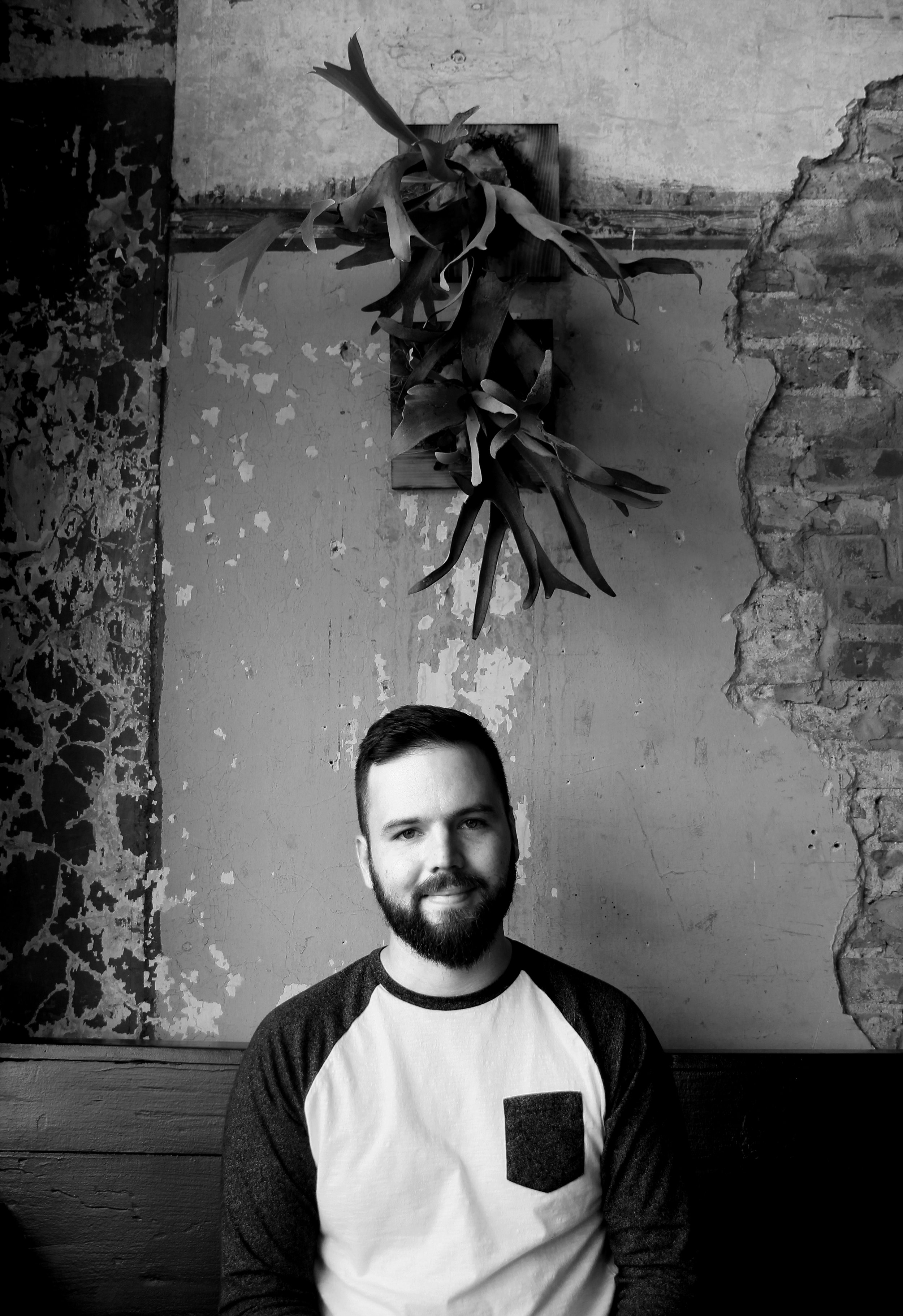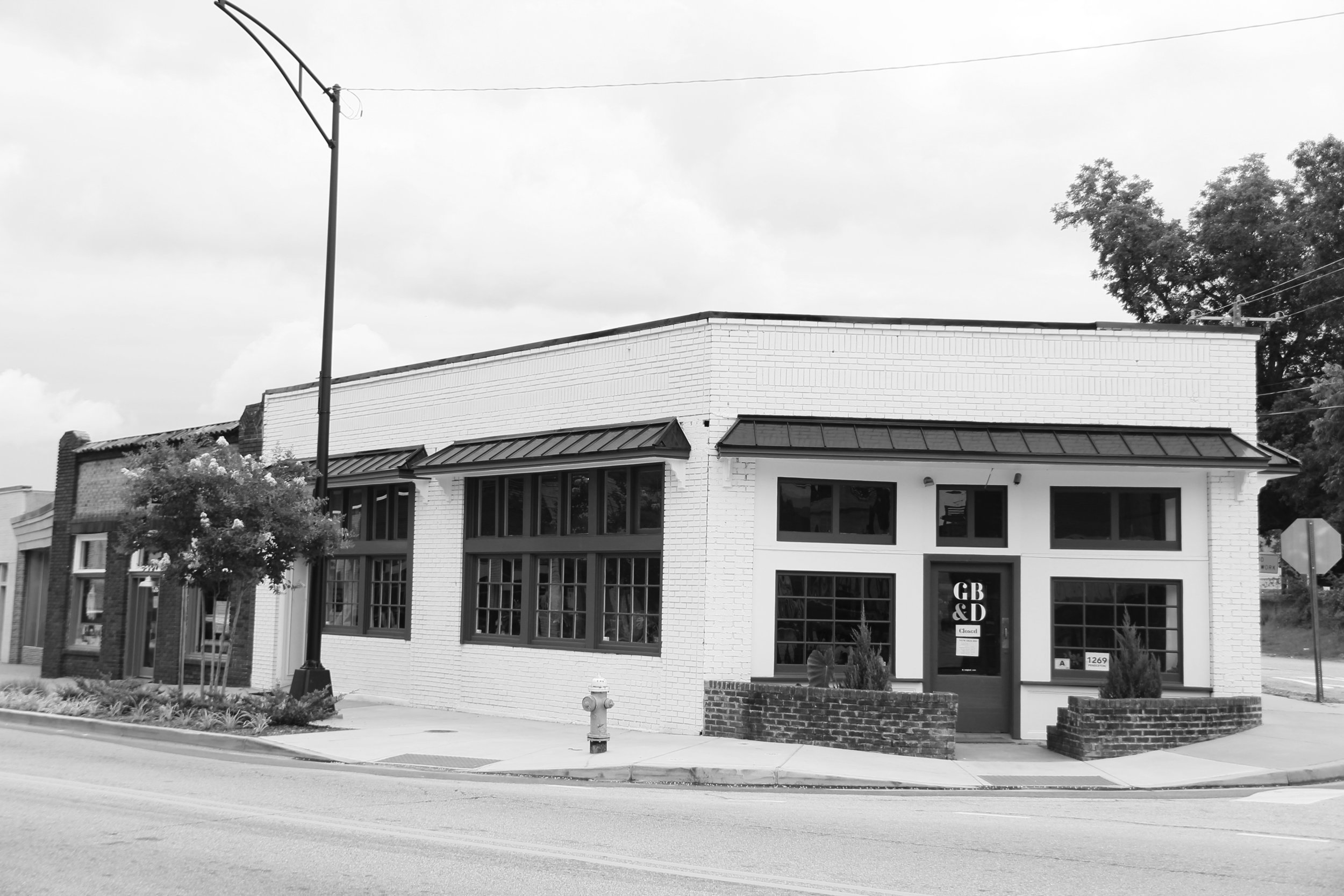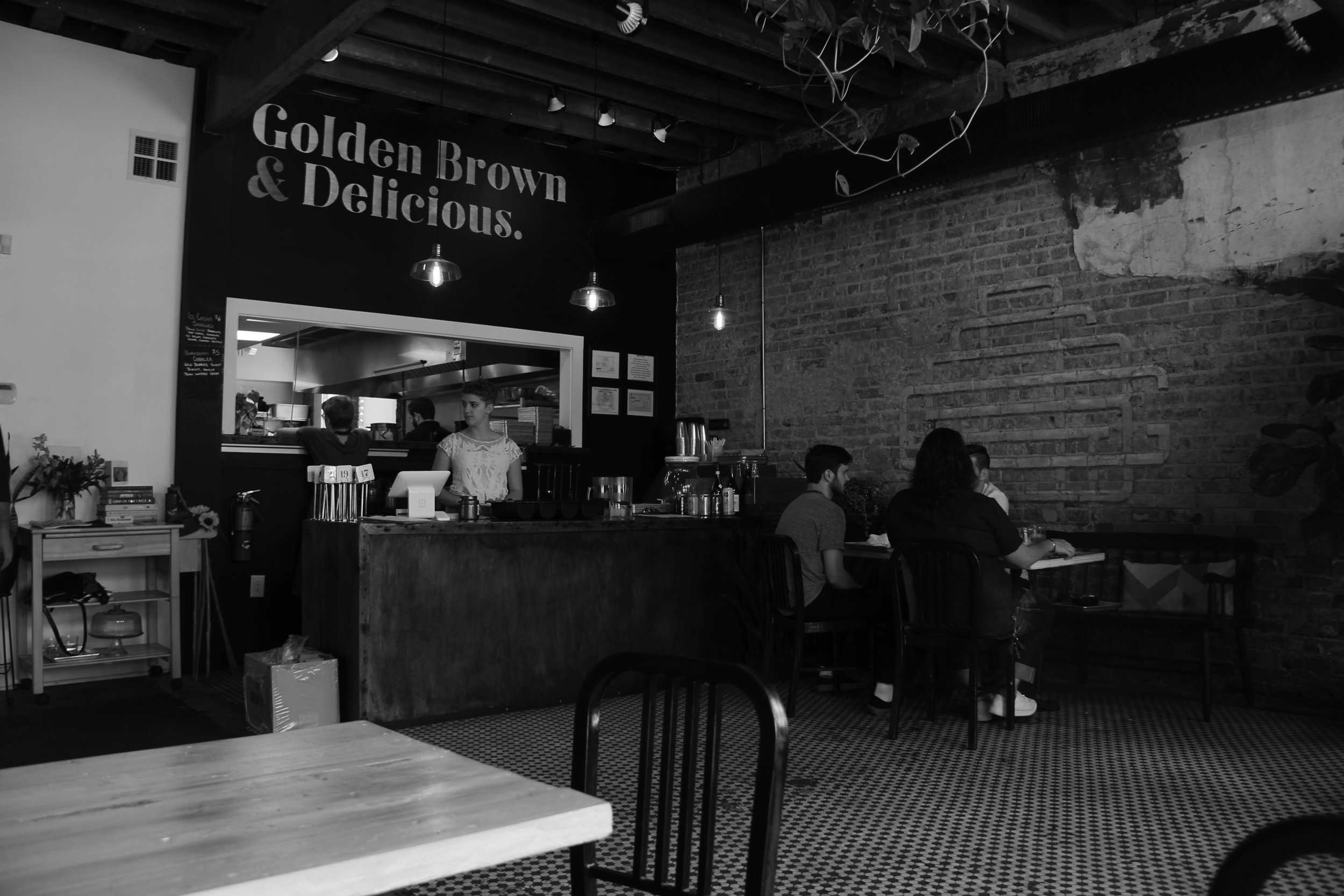Alex George
Chef and Entrepreneur
Owner of GB&D
"I like dialogue, which is why the kitchen is open. I like hearing from the customers to see whether there is anything I can do to make their experience better. You can see us back there having a good time. Sometimes, we are a little too rowdy, but it is just because we love what we are doing."
Full Interview
Tell me about why you started GB&D?
I started this business because I really enjoy cooking and I really enjoy working with people. Owning your own restaurant is the easiest way to do both. You can cook and you get to work awesome people. This will probably sound selfish, but I was just tired of working for other people. I wanted to do something on my own and see if I would be able to pull it off. My mindset was, I am investing a lot of time and energy into someone else’s vision (I cooked for a couple years at Stella’s Southern Bistro). So I just really enjoyed cooking and I thought, I can do this better than basically everyone. There are no restaurants like this in Greenville. I didn’t know if it would work, but this is the kind of restaurant I wanted to see happen, so, here we go.
How did you learn to cook?
I would consider myself mostly self taught, or taught by the internet. I am constantly googling. Someone was talking to me about perch fish, and I said “I don’t even know what perch fish is!” The internet is definitely my most used tool in the kitchen.
What forms the aesthetic and culture of this business?
GB&D is counter service— super casual but we are putting out high quality food. Conceptually, there aren’t any restaurants like this in Greenville. There is no head chef here. No sous chef. We just work together and everyone has a say. At the end of the day, if a decision needs to be made, it comes back to me because obviously that is my role as the owner.
This seems unique.
I’m sure this model exists elsewhere in the broader food world, but this was just the way I wanted to run the business. There is no restaurant in Greenville that have been built from the ground up like this. It took a lot of hard work to get here. This team works incredibly hard and I always want to share recognition with them. GB&D is a creative collaboration in many ways.
Tell me about your ingredients.
Our ingredients are as good as they can get. Ninety percent of our food is locally sourced, everything from veggies to proteins. Obviously I can’t get russet potatoes from Greenville, but outside of that, if it is a vegetable and out of season, I don’t use it. Even with tomatoes, I try really hard to get local hydroponic tomatoes all year round. We are still getting fresh local tomatoes in September (we are in the South... you know).
All of our beef and most of our pork comes from Providence Farm, which is in Easley, SC (in Pickens County). We get a large quantity of vegetables from the Reedy River Farms, Crescent Farms, Bio-Way Farms, Thicketty Mountain Farms, from Swamp Rabbit Cafe— I am up there, everyday. It is not super cost effective but they bring in items from all over the region as well as NC and Georgia. Sometimes in the Appalachian region you can get tomatoes for longer. Abundant Seafood is where all of our seafood is sourced. Our shrimp and our Trigger fish, on the menu today is from there. They catch their fish out of Charleston and make deliveries once a week. We try to sell all of it within three days— it is super fresh stuff. Really, really good stuff. Sustainably caught fish, which is important, because fishing is pretty detrimental to the environment. Even Wild Caught USA fish are pretty terrible in terms of sustainability. Shrimpers just catch all kinds of other stuff accidentally. We focus on what is seasonal, local, and caught with sustainability in mind.
I will make exceptions, because while my goal is to be local, if I really like something, like the Anderson Valley beers we carry, I will make an exception.
So how do you put together the menu?
If it is something I want to do, or my team wants to do, we are going to pursue that. If they are in a position where they are having to do things they aren’t excited about, it’s going to show in their work. Our kitchen is not micromanaged. I want to create an atmosphere where people can express themselves.
Tell me about the GB&D team.
I’ve got people in the kitchen with varied backgrounds. Some have never been in a kitchen before, I’ve got a couple employees who come to us from Project Host which is part of the CC Pearce Culinary School. Becca came to us from Charleston, Chris came to us from a restaurant he started. He is an incredibly talented cook. We are trying to pull in people who are talented at what they do and who just might not care about being super fancy. They just want to put out really good food. If there is something a team member wants to try, we are going to work together to figure it out. In the kitchen there are 100 ways to do any one thing.
You seem to really prioritize the cultivation of your working culture.
When it comes down to it, businesses are only successful if the people there are happy and invested. Turnover is the highest cost in the kitchen. If you get people who stick around, who you can trust to take responsibility, it allows you to do so much more, to be so much more flexible. We are at a point where I think, we have our routine on lockdown and so we can start reaching out more into the community.
What might that mean for West Greenville?
That has been the goal for a while. I am still thinking through our methodology, but being philanthropic as a restaurant has always been my goal. It is not the primary goal. Cold hard facts: you have to strive toward being successful to sustain a business. We are a part of the Sunday super this year and we are planning to do more, but I am just not sure what is the most beneficial. We have considered having a menu item that is in red, and 25% of the proceeds go toward cause we choose.
Who are you looking toward as you think through this?
The primary organization I see really doing good through food in Greenville is the Culinary school up the street. The Culinary School raises money for the Soup Kitchen. They advocate for people who are unemployed or under-employed and for nine weeks they train these individuals to work in a kitchen so they will have marketable skills. These people are actually trying to do good through their food. The students there, everyday, make lunch for 300 kids and then additionally learn basic culinary skills. Every third Thursday they do a dinner over there, a ticketed dinner which is delicious, and they will often bring in guest chefs or students who have graduated. It is incredible.
You have collaborated a bit with Mill Village Ministries, correct?
I am always open to being approached. We make dinners for the Nasha Lending Group when they do their classes. They are part of the Mill Village Ministries. It is an entrepreneur class for women of color who want to start their own businesses, a group majorly under-represented in the business sector across the world. It’s a three hour class, and they have tons of resources, as well as micro loans. The Mill Village is great-I miss the market! I used to go down there quite a bit.
You seem passionate about people, about hospitality.
I want people to feel super relaxed and super comfortable. Because that is how I want to feel. I don’t want to feel doted upon or bothered. I want to know, if I need something, it will be available to me, I want to feel like I can ask stupid questions. If you have never had trigger fish before I am more than happy to tell you all about it. We are all in process. Learning. People who have an interest in learning, I really respond to that. If someone asks me a question which causes me to reflect a bit more deeply, I am grateful for the opportunity to do so.
There is a really open exchange between those in the dining area and those in the kitchen.
I like dialogue, which is why the kitchen is open. I like hearing from the customers to see whether there is anything I can do to make their experience better. You can see us back there having a good time. Sometimes, we are a little too rowdy, but it is just because we love what we are doing.
So that is intentional, the openness of the space?
I have been in environments where I felt like I didn’t have a voice, and I don’t want anyone to feel like that. Often, chefs have this mentality that, it’s my way of the highway. Which is easy to do in the kitchen because it is stressful and intense, and everything is moving super super fast all of the time. But it can still be respectful. I don’t have to yell and throw things. I can sometimes struggle with that because that was the way I was trained, but I recognize that I make mistakes just like everyone else and so I try to afford everyone the same level of respect I would like myself.
Giving people dignity in a way…
Not to be clique, but, you just got to be nice to people. You have to build relationships because that is going to pay off in the long run. People are a lot more forgiving when you admit, hey we aren’t perfect, but we are trying really hard, and I’m not claiming this will be the best food you ever have.
In conversation with you sister Lindsey (owner of the Village Grind) I learned that your family and experiences of hospitality growing up where hugely informative for both of you.
My parents are probably the best hosts you can imagine. It is always at the cost of their own comfort that they will make people feel comfortable. They will just go above and beyond. Growing up, if someone was coming over, you made sure the house was clean, that you looked moderately clean…If our guest was even remotely hungry there would be something wonderful on hand to serve them. They wanted to make people feel as comfortable and at ease as possible. That sort of mentality just carries through. I will see someone I know, who might walk back into the kitchen and I say, “Quick! Everyone clean up the kitchen!” On some level, it is a pride thing. We want to be proud of the work we are doing.
And a lot of that came from your parents.
Respect was hardcore drilled into us, growing up. You don’t agree with someone? Well, you can still be courteous and respectful. At the very most, you can stay clear, but my parents were the two kindest people you will ever meet and while I am not nearly as kind as they are, some of that did rub off.
How many of your siblings work with you?
If I could get my oldest brother to work here, at least one day, all six of us will have worked in the same building. Stacey and Jay work here, but I can never get Jay to clock in. He’ll just come by to help me shut down or as needed.
You and Lindsey are doing a lot to set the bar for culture makers in West Greenville.
The main reason I am in the Village is because of Lindsey. Lindsey put herself at pretty big risk by opening her coffee shop. No one knew about this area except the artists, no one considered this an up and coming neighborhood before Lindsey created a space for people to gather and start building culture. I don’t think she gets enough credit for that. Bigger places with more money get credit. She is the driving force behind a lot of the growth that has moved to this area. My mentality was, I would like to start this business, Lindsey needs someone else to plant some roots, to establish that, yes, this is an area that can become successful. That huge hole in the wall (between our businesses) was a decision we made intentionally.
Your proximity to each other has been mutually beneficial.
It has allowed her to increase business, and the added traffic has been great. I don’t think I am speaking out of turn to say we drive business to each other. What we are doing is pretty unique. There just are not a whole lot of independently owned businesses that weren’t fronted by a ridiculous amount of money. We did this—obviously there is money involved— but it was not like we had multi-million dollar investors who manufactured this success for us. Lindsey’s hard work is to thank for that. She is so quiet and such a hard worker, you rarely hear her talk about how hard she works. The Village Grind is her heart and soul down there. But she is so caring and nice, you will never see any push back when people start to step on her toes. We get compared a lot to other people, and that is never what we wanted. We aren’t trying to be like anyone else, because this is just what we enjoy doing.










































